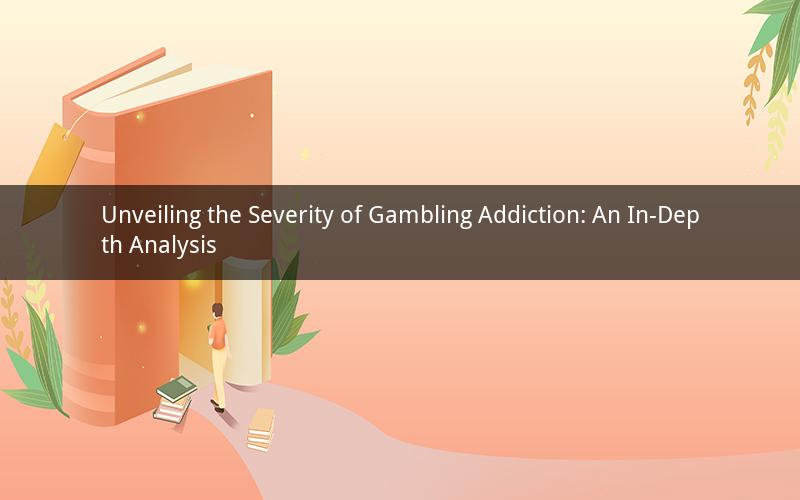
Introduction:
Gambling addiction, also known as problem gambling, has become a significant concern in today's society. This article delves into the seriousness of gambling addiction, exploring its impact on individuals, families, and society as a whole. By understanding the gravity of this issue, we can take appropriate measures to address and prevent it.
1. Defining Gambling Addiction
Gambling addiction refers to the compulsive and uncontrollable urge to gamble, despite negative consequences. It is characterized by a loss of control over gambling behavior, increasing tolerance to gambling, and a desire to stop but being unable to do so. Problem gambling can range from mild to severe, affecting individuals of all ages, genders, and socioeconomic backgrounds.
2. The Severity of Gambling Addiction
The severity of gambling addiction can be assessed through various factors, including the extent of financial, emotional, and social consequences. Here are some key aspects that highlight the seriousness of this addiction:
a. Financial Consequences
Gambling addiction can lead to significant financial losses. Individuals may go into debt, sell off valuable possessions, or even steal to fund their gambling habits. The financial burden can also extend to family members, who may have to bear the brunt of their loved one's addiction.
b. Emotional Consequences
Gambling addiction can have severe emotional consequences, including depression, anxiety, and mood swings. Individuals may experience feelings of guilt, shame, and despair due to their addiction. In some cases, it can lead to self-harm or even suicidal thoughts.
c. Social Consequences
Gambling addiction can strain relationships with family, friends, and colleagues. It can lead to isolation, as individuals may withdraw from social activities and neglect their responsibilities. The addiction can also result in broken marriages, estranged family relationships, and loss of employment.
d. Health Consequences
Gambling addiction can have detrimental effects on an individual's physical and mental health. Chronic stress, sleep deprivation, and poor nutrition can contribute to a range of health issues, including heart disease, hypertension, and weakened immune system. Additionally, the emotional turmoil can exacerbate existing mental health conditions.
3. Impact on Families and Society
The severity of gambling addiction extends beyond the individual, affecting families and society as a whole. Here are some of the consequences:
a. Family Struggles
Gambling addiction can lead to broken families, as individuals may prioritize their gambling habits over their responsibilities. Children may suffer from emotional and psychological trauma, witnessing the destruction of their family unit.
b. Economic Burden
The financial consequences of gambling addiction can have a significant impact on the economy. It can lead to increased crime rates, reduced productivity, and higher healthcare costs. Taxpayers may also bear the burden of supporting individuals struggling with gambling addiction.
c. Social Costs
Gambling addiction can lead to social problems, such as homelessness, unemployment, and increased demand for social services. It can also strain law enforcement and judicial systems, as individuals may resort to illegal activities to fund their addiction.
4. Prevention and Treatment
Addressing gambling addiction requires a multi-faceted approach, including prevention and treatment. Here are some strategies:
a. Education and Awareness
Increasing awareness about the risks and consequences of gambling addiction is crucial. Education programs can help individuals recognize the signs of addiction and seek help before it becomes severe.
b. Treatment Options
Various treatment options are available for individuals struggling with gambling addiction. These include therapy, support groups, and residential programs. Treatment should be tailored to the individual's needs and may involve addressing underlying issues contributing to the addiction.
c. Support Systems
Creating support systems for individuals with gambling addiction is essential. This can include family therapy, support groups, and community resources. Encouraging individuals to seek help and providing them with a supportive environment can aid in recovery.
5. Conclusion
Gambling addiction is a serious issue with far-reaching consequences. Its impact on individuals, families, and society cannot be underestimated. By understanding the severity of this addiction, we can take proactive steps to prevent and address it. Education, treatment, and support systems are crucial in combating gambling addiction and promoting a healthier society.
Questions and Answers:
1. What are the main signs of gambling addiction?
Answer: The main signs of gambling addiction include an inability to control gambling behavior, neglecting responsibilities, borrowing money to fund gambling, and experiencing negative consequences such as financial, emotional, and social problems.
2. How can gambling addiction be prevented?
Answer: Prevention involves increasing awareness about the risks and consequences of gambling addiction, implementing responsible gambling policies, and promoting healthy alternatives to gambling.
3. What are the most effective treatment options for gambling addiction?
Answer: Effective treatment options for gambling addiction include therapy, support groups, residential programs, and addressing underlying issues contributing to the addiction.
4. Can family therapy help in treating gambling addiction?
Answer: Yes, family therapy can be beneficial in treating gambling addiction. It helps address the impact of the addiction on family members and provides a supportive environment for recovery.
5. How can society support individuals struggling with gambling addiction?
Answer: Society can support individuals with gambling addiction by increasing awareness, providing access to treatment programs, and creating supportive environments. Encouraging individuals to seek help and offering resources can aid in their recovery process.